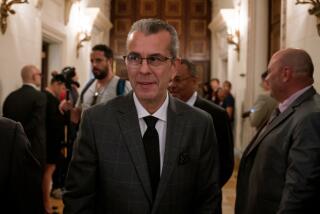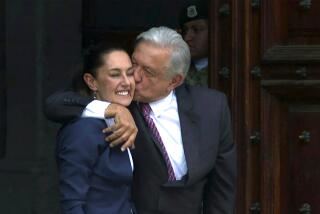Reviews Mixed on Nicaragua’s Vote Overseers
- Share via
MANAGUA, Nicaragua — Two members of the ruling Sandinista Front, two opposition activists and a self-described “conservative without a party” have been named by the Sandinistas to oversee Nicaragua’s elections next February, a lineup that got mixed reviews from the opposition Thursday.
Anti-Sandinista leaders criticized the method of choosing the five-man Supreme Electoral Council and objected to the reelection of Mariano Fiallos Oyanguren, a Sandinista, as its president. But they said they were hopeful that the supposedly neutral member, Rodolfo Sandino Arguello, would tip the balance in their favor in any electoral dispute.
Sandino Arguello, 60, served eight years on the Supreme Court under President Anastasio Somoza and was president of that tribunal when the Sandinistas fought their way to power 10 years ago and dissolved it. Now dean of the law school at the Jesuit-run Central American University in Managua, he says he dropped out of Conservative Party politics “12 or 15 years ago.”
‘Not the Best’
Guillermo Selva Arguello, an agronomist active in the Independent Liberal Party, and Aman Sandino Munoz, a cardiologist and Conservative Party member, were named to represent the opposition on the council. The two Sandinista members, Fiallos and Leonel Arguello Ramirez, are lawyers.
“This is not the best possible council, but it is minimally acceptable,” said Luis Humberto Guzman, an opposition member of the Sandinista-controlled National Assembly after it chose the panel Wednesday night from nominees submitted by President Daniel Ortega.
The council will have broad powers to enforce the law governing the Feb. 25 elections of a president, a vice president, a new assembly and municipal governing boards. It will name three-member councils to oversee voting in each of Nicaragua’s nine regions, allocate public funds and television time to parties in the race, organize voter registration, supervise an electoral police force and certify the official vote count.
Demand for Changes
Opposition leaders said they will also ask the council to accept their demand for election rules changes, such as allowing Nicaraguan exiles to cast ballots abroad and barring Sandinista soldiers from voting at army facilities. Whether the council has such power is a matter of dispute.
The previous council was made up of three Sandinistas and two opposition party members. It was discredited in the eyes of the opposition for failing to control alleged voting irregularities in 1984, when the Sandinistas got two-thirds of the vote.
By law, the assembly could have preserved the 3-2 Sandinista majority on the council. But Ortega agreed last February, as part of a Central American plan to end the Contra war, to give the opposition “equitable representation.” He did so by asking the assembly to chose the fifth member from his list of “notable” Nicaraguans of no party affiliation.
Opposition leaders asserted that Ortega had also promised Venezuelan officials who are monitoring the Nicaraguan election that the “notable” member would be chosen by consensus of the government and opposition and that both opposition council members would be from the main anti-Sandinista bloc of 14 parties.
Broken Promise?
Instead, the president sent his own list without formally consulting the opposition. It reserved one council seat, that given to Sandino Munoz, for a Conservative faction that is at least as hostile to the anti-Sandinista bloc as it is to the government.
“Ortega didn’t comply with his promise,” said Virgilio Godoy, the Independent Liberal leader. “He sent his lists and put the assembly in a straitjacket.”
Sandinista assemblymen countered that 10 of the 12 names submitted to Ortega by the coalition, known as the National Opposition Union, were among the 46 people he nominated.
Godoy called Sandino Arguello “the least of three evils” nominated by Ortega as the nonpartisan council member. But most other opposition leaders said they respected the former judge and expressed confidence in his impartiality.
Silviano Matamoros, a Conservative leader in the opposition union, said the re-election of Fiallos, who headed the council during the 1984 campaign, was a setback. Ortega had asked the assembly to consider the law professor’s “honesty, capacity and experience” in making its choice.
“The election campaign is starting badly,” Matamoros said. “The make-up of the council was an opportunity for the government to lay a basis of confidence in the elections, but it lost that opportunity.”
More to Read
Sign up for Essential California
The most important California stories and recommendations in your inbox every morning.
You may occasionally receive promotional content from the Los Angeles Times.










